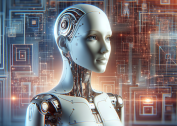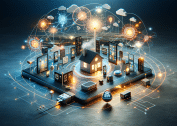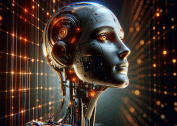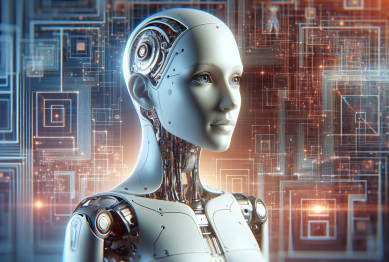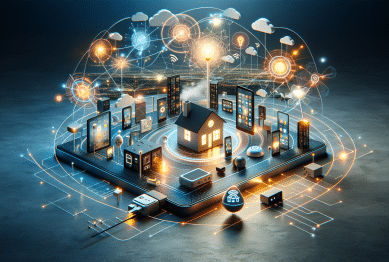Artificial Intelligence (AI) is no longer a concept of the future—it’s part of our everyday lives. From smart homes to personalized healthcare, AI is driving a new era of “smart living.” It’s transforming the way we live, work, and manage our health, money, and cities. This article explores how AI is shaping our daily lives and what the future of smart living looks like.

What is Smart Living?
Smart living means using AI-powered devices and systems to make life more convenient, efficient, and safe. It includes smart homes, AI in healthcare, autonomous vehicles, smart cities, and finance tools that manage your money automatically.
1. Smart Homes: Enhancing Convenience and Efficiency
AI is making homes more intuitive and responsive. For example, voice assistants like Alexa, Google Nest, and Apple HomeKit allow users to control lights, temperature, and security with simple commands.
Key Benefits:
Greater comfort: Moreover, AI adjusts lighting and temperature based on user preferences for a more personalized experience.
Energy savings: Smart thermostats learn daily routines and adjust settings automatically. As a result, energy use drops, and bills shrink.
Improved security: In addition, AI cameras and sensors detect unusual activity and send alerts in real time.
2. AI in Healthcare: Personalizing Treatment and Diagnostics
AI tools are transforming healthcare. Systems like IBM Watson Health analyze patient records and genetic data to suggest tailored treatments. As a result, both accuracy and speed of diagnosis improve.
Key Benefits:
Real-time monitoring: Furthermore, devices like Fitbit and Apple Watch track vital signs and alert users or doctors to any changes.
Early diagnosis: For instance, AI can detect conditions like cancer earlier than human doctors.
Personalized treatment: Additionally, AI adjusts care plans based on a person’s unique genetic profile and history.
3. AI-Powered Transportation: The Age of Autonomous Vehicles
AI is also revolutionizing the way we travel. Autonomous vehicles, developed by Tesla and Waymo, use AI to navigate roads, avoid accidents, and choose the best routes.
Key Benefits:
Greater convenience: As a result, passengers can relax or work while AI handles the drive.
Higher safety: Because AI reacts faster than humans, road accidents may decrease significantly.
Improved traffic flow: In addition, AI cars communicate with each other to reduce congestion and save fuel.
4. Smart Cities: The Future of Urban Living
Cities like Singapore and Barcelona are becoming smarter with the help of AI. These cities use AI to manage traffic, save energy, and boost public safety.
Key Benefits:
Efficient traffic management: Moreover, traffic systems adjust lights based on real-time data to keep cars moving smoothly.
Better energy use: AI-powered smart grids reduce waste by balancing energy demand and supply.
Faster emergency response: Additionally, AI surveillance systems can detect threats and alert authorities instantly.
5. AI in Personal Finance: Smarter Money Management
AI is also helping people manage money better. Apps like Digit and YNAB track spending and automate savings. Similarly, robo-advisors such as Betterment and Wealthfront offer personalized investing.
Key Benefits:
Fraud prevention: Furthermore, AI detects unusual transactions and alerts users to possible fraud.
Automatic savings: AI studies spending patterns and moves money into savings accounts automatically.
Tailored investment advice: In addition, robo-advisors build personalized portfolios to match financial goals.
Conclusion: AI and the Future of Smart Living
AI is revolutionizing every facet of our lives, from how we manage our homes to how we interact with our cities and healthcare systems. As AI technologies continue to evolve, the future of smart living will become even more integrated and personalized, helping us live more efficiently and conveniently. AI isn’t just changing the way we interact with machines; it’s also shaping the future of how we live.
By embracing AI-driven technologies, we are creating a world where smart living becomes the new norm—where everyday tasks are automated, healthcare is personalized, and our cities function more sustainably. Ultimately, the future of AI is here, and it’s revolutionizing our lives in ways we can only begin to imagine.
References:
1. Digital Trends – “How much will a smart thermostat really save on energy costs?”.
2. Google’s official blog – “Behind the scenes with the new Nest Thermostat”.
3. Google Store – “The Nest Learning Thermostat is smarter and sleeker than ever”.

